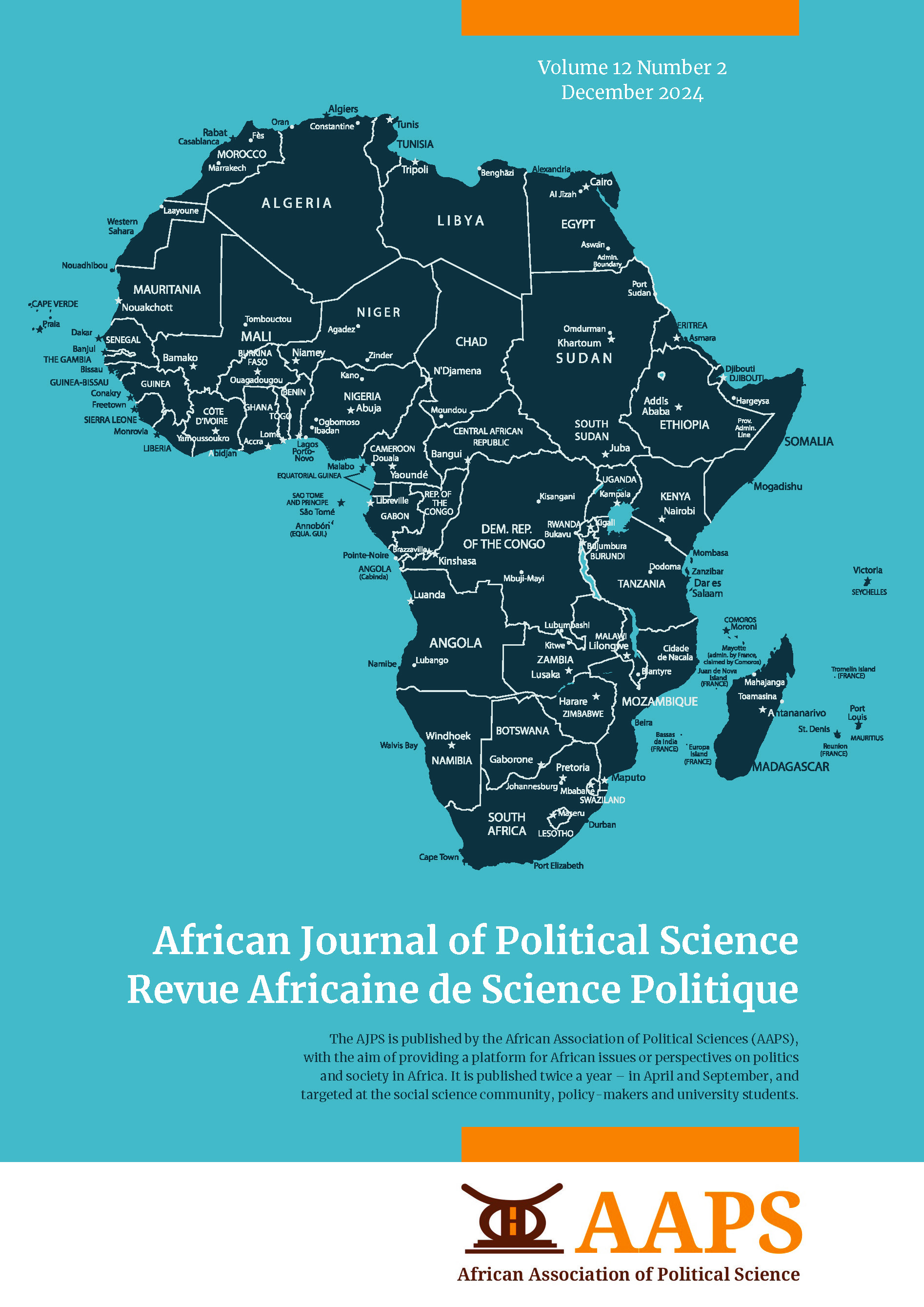Analysing the manipulation of the youths, election violence and democratic retrogression in South Africa
Main Article Content
Keywords
Democracy, Democratic Retrogression, Election violence, youths, South Africa
Abstract
Since the introduction of elective democracy in the 1990s, South African youths have played a significant role in the democratic process. Sadly though, while some are building from the past experiences of the 1976 youths, others are deeply engrossed into crimes, violence, and thuggery. Several factors have been identified as the drivers of South African youths into different forms of criminalities. Prominent among them are the pauperization of the youths by the state, unemployment, and their manipulation by the political elite. Rather than replicating the character of the youths of the 1970s who fought for better education and life as well as the freedom of the black population during the dark days of apartheid, some youths have taken to drugs, election violence while others have become personal security to top politicians owing to difficult economic hardship. The paper opined that to address this anomaly, there is the need for the South African youths to rediscover themselves by positioning themselves into politics and never expect the government to empower them cheaply. Also, the voice of the youths must not only be heard but be felt through character, integrity, disciplined and quality leadership. Through this, they will be able to shape policies and direction of government, and the future of many unborn generations. The qualitative research techniques were used for this study. Data was collected through interviews and focus group discussions in five sampled locations in KwaZulu-Natal. The thematic and inductive method of analysis was used in aiding the analysis of the generated data.
Article Metrics Graph
References
Aniekwe, C.C and Kushie, J. 2011, Electoral Violence Situational Analysis: Identifying Hot-Spots in the 2011 General Elections in Nigeria, Abuja: National Association for Peaceful Elections in Nigeria (NAPEN
Archibald, M. M Sarah. Munce, S. 2015. Challenges and strategies in the recruitment of participants for qualitative research. University of Alberta Health Sciences Journal, 11 (1), 32-37
Ashindorbe, K. 2018. Electoral Violence and the Challenge of Democratic Consolidation in Nigeria. India Quarterly, 74(1), 92–105. https://doi.org/10.1177/0974928417749639
Averill, J.B. 2002. Matrix analysis as a complementary analytic strategy in qualitative inquiry. Qualitative Health Research, 12(6), 855-66. https://doi.org/10.1177/104973230201200611
Bekoe, B. ed. 2012.Voting in Fear: Electoral Violence in Sub-Saharan Africa (Washington, DC: United States Institute for Peace
Bhattacherjee, A. 2012. Social Science Research: Principles, Methods, and Practices. University of South Florida
Creswell, J. W. 2012. Qualitative inquiry and research design: Choosing among five approaches., CA, Thousand Oaks, Sage.
Davids, Y.D., Masiya, T., Struwig, J., Gordon, S and Roberts, B. 2016. Youth interest and understanding in South African politics. Human Sciences Research Council, Media brief.
Eneji, A.P and Ikeorji, C.R. 2018. Youth Political Participation and Electoral Violence in the 21st Century Nigeria: Bridging the Gap. World Journal of Innovative Research (WJIR), 4(6), .9-13.
Fischer, J. 2002. Electoral Conflict and Violence IFES, Washington, D.C.
Glanvill, S. 2011. Analysing the construction of South African youth in historical-related images and texts around the time of 16 June 2011. Yesterday &Today, No. 7, July 2012.
Gwinn R. & Nortan, P. 1992. The New Encyclopedia Britannica, Chicago: University of Chicago Press.
Höglund, Kristine and Anna Jarstad 2011. Toward electoral security: Experiences from KwaZulu-Natal. Africa Spectrum, 46 (1), 33–59. https://doi.org/10.1177/000203971104600102
Isola, O. 2018. Southern Voices: Election Violence and the Future of Democracy in Africa. Available online at https://africaupclose.wilsoncenter.org/election-violence-and-the-future-of-democracy-in-africa/ [03/10/2019]
Liliesleaf. 2017. Civil Resistance: The Role of the Youth in the Struggle – Liliesleaf. Available online at http://www.liliesleaf.co.za/wp-content/uploads/2017/03/Grade-12.pdf[30/09/2019]
Majekodunmi, R., and Adejuwon, K. D. 2012. Electoral Administration and the Consolidation of Democracy: An overview of 2011 General Elections in Nigeria. IJPSS, 2(5), 1-26.
Mugisha, M., Ojok, D., Kiranda, Y and Kabasa, B.B. 2016. Youth Participation in Political Processes in Uganda: Exploring Opportunities and Constraints. Journal on Perspective of African Democracy and Development, 1(1), P.55-61
Ngcebetsha, T. 2018. Young people must take the baton from the heroes of 1976. Mail and Guardian, 28 June 2018.
Okello, O. 2016. Youth Political Participation and Electoral Violence in Africa. Paper presented at a regional conference on political parties and electoral violence in Africa organised by the West Africa Institute, IDEA, African Union and La Francophonie in Praia, Cape Verde, Sept 21–22, 2016
Plaut, M. 2018. South African elections take place against a background of violence. Daily Maverick, February 8, 2018.
Przeworski, A. 1991. Democracy and the Market. Cambridge, UK: Cambridge University Press
Samuel, O. 2017. Youth Involvement in Political Violence/Thuggery: A Counter Weight to Democratic Development in Africa. Journal of political Science and Public Affairs, 5(3), P. 280
Schuld, M. 2013. Voting and violence in KwaZulu-Natal’s no-go areas: Coercive mobilisation and territorial control in post-conflict elections. African Journal on Conflict Resolution, 13(1), P. 101-124.
Seifu, T.T. (2012). Causes of Electoral Violence: Lessons from the May 2005 Election of Ethiopia, Thesis Submitted in Partial Fulfillment for the Award of Master of Philosophy in Peace and Conflict Transformation, University of Tromsø, Norway.
Taylor, C. 2018. Shared Security, Shared Elections Best practices for the prevention of electoral violence. A study by the American Friends Service Committee (AFSC) July 2018.


